News
This Might Encourage You To Save Your Money
March is Women's History Month, and this Sunday, March 8, marks International Women's Day — perfect timing to talk about changing who's portrayed on our currency. Women on $20s' campaign to replace Andrew Jackson and put women on the $20 bill — influential women like Harriet Tubman and Sojourner Truth — is beginning to gain traction. The nonprofit has compiled a list of 15 influential American women whose accomplishments have positively benefited society as a whole. Candidates ranging from former Texas Sen. Barbara Jordan to Feminine Mystique author Betty Friedan are up for vote on the Women on $20s website, which also includes detailed biographies of each candidate.
This first round of voting is only the beginning for the group, who plan to forward their petition to the White House once they end their final voting round, ultimately settling on a standalone candidate and securing at least 100,000 signatures. The group has already amassed thousands of signatures, according Women on $20s Executive Director Susan Ades Stone. It's unclear who's currently the frontrunner in Women on $20s' voting campaign, though voting for your favorite three candidates does get you a photo of suffragist Alice Paul raising a glass of wine.
President Obama is well aware of the need for women to be better represented on currency. In a recent speech, he even acknowledged a letter that a girl had written him requesting that women be pictured on money:
Last week, a young girl wrote to ask me why aren’t there any women on our currency and then she gave me like a long list of possible women to put on our dollar bills and quarters and stuff — which I thought was a pretty good idea.
If U.S. currency could talk, its most vocal opponent would probably be — oddly enough — the man on the $20 bill. Andrew Jackson hated paper currency, a fact acknowledged by the former seventh president of the United States both vocally and often. Jackson addressed the evils of paper currency in his 1837 presidential farewell address, stating that:
The paper system being founded on public confidence and having of itself no intrinsic value, it is liable to great and sudden fluctuations, thereby rendering property insecure and the wages of labor unsteady and uncertain.
In short, Jackson felt paper to be unreliable. Historically, he preferred measuring his monetary wealth in precious metals and distrusted banks almost as much as the money they house. While not even remotely known for his commitment to equality — a Slate article decrying Jackson's place on currency immediately calls him out as genocidal — it's only natural that the man who hated paper be retired from the thing he loathed in favor of an inspirational woman.
Image: Women on $20s (1)
